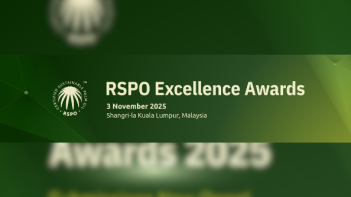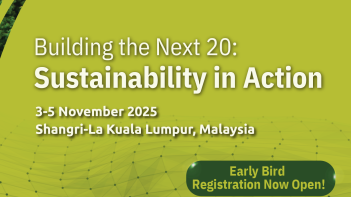RSPO Certified independent smallholder group hosts orangutan pre-release event, driving conservation efforts for the second straight year, through the help of RSPO Credits.
As the boat glided alongside the coastline of Pulau Salat, a familiar, caramel-coated creature watched from behind a curtain of leaves. Leaping from a banyan tree branch, it followed the visiting guests, showing off its adroit swinging skills in his adopted habitat.

Here among the lush forests of Pulau Salat, Central Kalimantan, Indonesia, orangutans are free to roam and partake of the abundant supply of food sources – not a bad place at all for the friendly primates to undergo rehabilitation, also termed as “attending forest school”, before they are released back into the wild. From the moment of their rescue, orangutans are slowly rehabilitated in a pre-release sanctuary in Pulau Salat as part of their adaptation process, which on average takes between seven to 10 years.
Honing survival instincts
As the island resembles their natural habitat, rehabilitated orangutans get the chance to hone their survival instincts independently, under the close monitoring of dedicated technicians, before they are released into their true habitat. Several activities are carried out such as monitoring the condition and daily behaviour of orangutans such as the process of making nests and feeding. Contact with people is minimised.
The pre-release of orangutans in this island sanctuary has been part of ongoing efforts to promote sustainable and responsible palm oil production that upholds the protection of vulnerable species like the Pongo pygmaeus – these magnificent great apes native to the Indonesian and Malaysian tropical rainforests.
Salat Island is a conservation sanctuary managed by the Borneo Orangutan Survival Foundation (BOSF) and PT Sawit Sumbermas Sarana (PT. SSMS), who are RSPO Grower members. In 2016, PT. SSMS purchased a part of Salat to dedicate it to orangutan rehabilitation and pre-release as part of their RSPO Remediation and Compensation (RaCP) initiative. They likewise should part of BOSF’s costs for island maintenance and monitoring.
Smallholders drive wildlife conservation with RSPO Credits
In October 2024, the RSPO Certified independent palm oil farmers association (APKSM) and PT.SSMS hosted a special gathering for buyers and media representatives to witness the release of Salat Island’s newest furry inhabitant, Zahri. He joins 40 other orangutans currently living in the Salat Island cluster.
The APKSM smallholder group has committed, for the second year in a row, to provide a year’s supply of food provisions for the orangutans, using their incentive funds from RSPO Credits. The provisions, made up of fruits and vegetables, are vital for the orangutans’ survival. The total amount of RSPO Credits allocated for orangutan feed is approximately IDR 30 million (about USD1,911), to cover two years.
“At RSPO, we believe that sustainable palm oil production can be a force for good, not just for communities but also for ecosystems,” said Guntur Cahyo Prabowo, RSPO Head of Smallholders. “The orangutan pre-release in Pulau Salat is a powerful reminder that with the right approach, we can protect endangered species while promoting responsible palm oil practices.”
“This is our second year of being part of the orangutan protection project, and we have learned so much about how we can make a difference in protecting our friends from the forest, when we come together as a group,” said Widodo, Group Manager of APKSM. “We feel proud of being part of this initiative and hope to continue in the coming years. We have learned so much from this initiative that implementing the sustainable practices of RSPO Certification in our farms is not only beneficial for us as smallholders, but also for our friends in nature such as orangutans.”

RSPO proudly supports this orangutan conservation initiative in collaboration with industry partners committed to protecting wildlife, particularly endangered species, as a vital part of sustainability efforts in the palm oil industry. RSPO continues to work closely with environmental NGOs, research institutions, and biodiversity experts to improve conservation practices.
Keep reading
RSPO accepted in the Netherlands as a private control system for EUDR

RSPO x JaSPON Conference and Member Engagement Forum 2025 Spotlights Japan’s Sustainability Success and Market Growth
Call for Expression of Interest: Independent Investigation of a Complaint
Call for Expression of Interest: Mexico National Interpretation Task Force for 2024 RSPO Principles and Criteria (RSPO P&C) and Independent Smallholder (ISH) Standard

RSPO–APKASINDO Partnership to Boost Inclusive Growth, Certification, and Market Access for Oil Palm Smallholders

Open Letter to COP30 President: Integrating Forests and Biodiversity: A Policy Central to Paris Agreement Success

Bridging the Auditing Divide: Key Takeaways from the RSPO Assurance Forum 11

Extension of RSPO Excellence Awards 2025 Submission Deadline!





